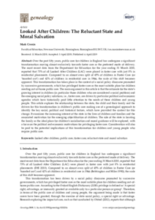Abstract: Over the past fifty years, public care for children in England has undergone a significant transformation moving almost exclusively towards foster care as the preferred mode of delivery. The most recent data from the Department for Education for the year ending 31 March 2018, reported that 73% of all Looked After Children (LAC) were placed in foster care with just 8% in residential placements. Compared to an almost even split of 45% of children in Foster Care (or ‘boarded out’) and 42% of children in residential care in 1966, the scale of this shift becomes apparent. This transformation has taken place in the context of a social policy discourse promoted by successive governments, which has privileged foster care as the most suitable place for children needing out-of-home public care. The main argument in this article is that the rationale for the state’s growing interest in children (in particular those children who are considered a social problem) and the emerging social policy solutions, i.e., foster care, are driven by particular political and economic agendas which have historically paid little attention to the needs of these children and young people. This article explores the relationship between the state, the child and their family and the drivers for this transformation in children’s public care making use of a genealogical approach to identify the key social, political and historical factors, which have provided the context for this change. It examines the increasing interest of the state in the lives of children and families and the associated motivation for the emerging objectification of children. The role of the state in locating the family as the ideal place for children’s socialisation and moral guidance will be explored, with a focus on the political and economic motivations for privileging foster care. Consideration will also be paid to the potential implications of this transformation for children and young people who require public care.

